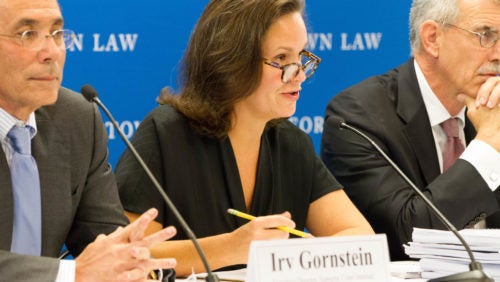A Look Ahead: Georgetown Law’s Supreme Court Institute Previews October Term 2017
September 21, 2017

Irv Gornstein, executive director of Georgetown Law’s Supreme Court Institute, with Gibson Dunn partner Helgi C. Walker and former U.S. Solicitor General Donald Verrilli at the SCI annual press briefing on September 19.
A year ago, the Supreme Court kicked off October Term 2016 with just eight justices and a noticeable absence of blockbuster cases. But October Term 2017 is shaping up to be a different story, with a full Court and a deep lineup of significant cases to be heard just within the first month. And on September 19, a powerhouse group of experts that included two former solicitors general gathered at Georgetown Law to explain to the nation’s media the intricacies of it all.
Irv Gornstein, executive director of Georgetown Law’s Supreme Court Institute, and Georgetown Law Professor Martin S. Lederman guided attendees through the legal storm that has been making headlines all year: the “travel ban” cases stemming from the Administration’s Executive Order suspending the entry into the United States of foreign nationals from six countries with predominantly Muslim populations. Georgetown Law Professor Neal Katyal, in fact, is counsel of record for Hawaii, which claims the move is outside the president’s statutory authority and constitutes discrimination based on nationality. Yet the Court may be required to find the challenges moot, as the suspension on entry of foreign nationals, and the cap on refugees, will soon expire.
Former U.S. Solicitor General Donald B. Verrilli, now a partner at Munger, Tolles & Olson, led the discussion of Masterpiece Cakeshop v. Colorado Civil Rights Commission — involving a baker’s refusal to make a wedding cake for a same-sex couple on First Amendment grounds.
“One of the really interesting questions here is, to what extent does the freedom of speech guaranteed in the First Amendment protect this activity?” Verrilli asked. “On the one hand, it’s a pretty reasonable claim that this is expressive activity…but [it] does raise the question of scope… What about the cabinet maker who believes that his or her works are expressive?… What about the medical advice doctors give to their patients? What about lawyers writing briefs?”
Former U.S. Solicitor General Paul Clement (F’88), a lecturer at Georgetown Law, helped explain Gill v. Whitford, a constitutional challenge to partisan gerrymandering. Paul M. Smith, a distinguished visitor from practice at Georgetown Law, will be arguing that case in October; Clement filed an amicus brief for the Wisconsin Senate and Assembly. “This case is obviously being closely watched…about whether the court is essentially going to come up with a standard to adjudicate partisan gerrymandering cases — or whether they will continue to treat partisan gerrymandering cases, unlike racial gerrymandering cases, as nonjusticiable,” Clement said.
Blockbusters
Williams & Connolly partner Kannon Shanmugam walked participants through a highly significant case exploring the intersection of the Fourth Amendment and modern technology: Carpenter v. United States, asking whether the warrantless seizure and search of historical cellphone site location data revealing the location of the phone — and its owner — over 127 days is permitted by the Fourth Amendment. And Gibson Dunn partner Helgi C. Walker livened up the morning for the press with a look at Christie v. National Collegiate Athletic Assoc. — concerning whether the Tenth Amendment allows Congress to prohibit states from repealing existing prohibitions on sports betting.
“Christie has all the makings of a great case, particularly from the point of view of the press,” Walker said. “It’s got a colorful and a famous governor, racehorses, bookies, the National Football League — and the anti-commandeering doctrine. What’s not to love?”
“But it has been 20 years since the Supreme Court has invalidated a federal statute under the anticommandeering doctrine, “ Walker continued. “If I were a betting person…I’d put my money on the proposition that the Court is about to strike down a statute under that doctrine again.”
Irv Gornstein and Dori Bernstein, director of the Supreme Court Institute, organized the press briefing. Attendees included representatives from the New York Times, Washington Post, CNN, National Law Journal, National Public Radio, Bloomberg and Associated Press.